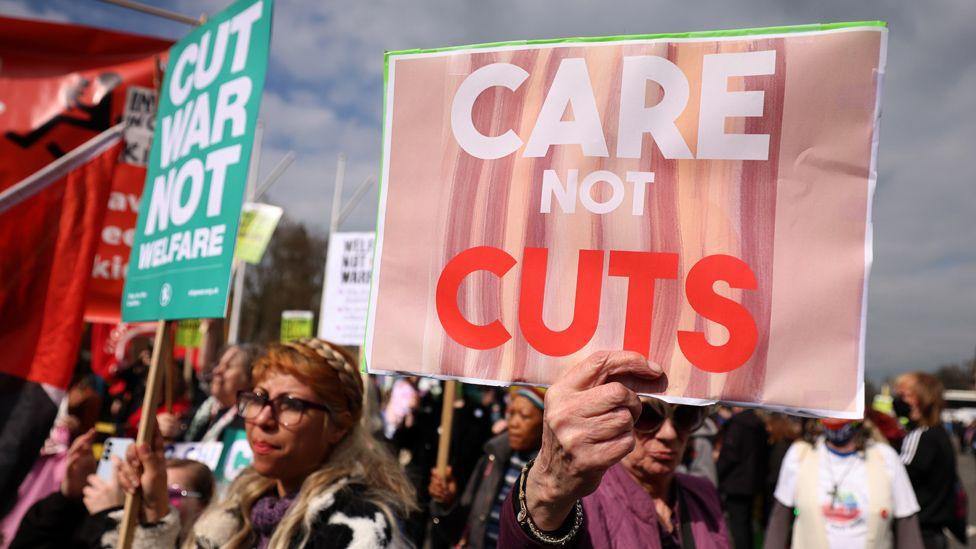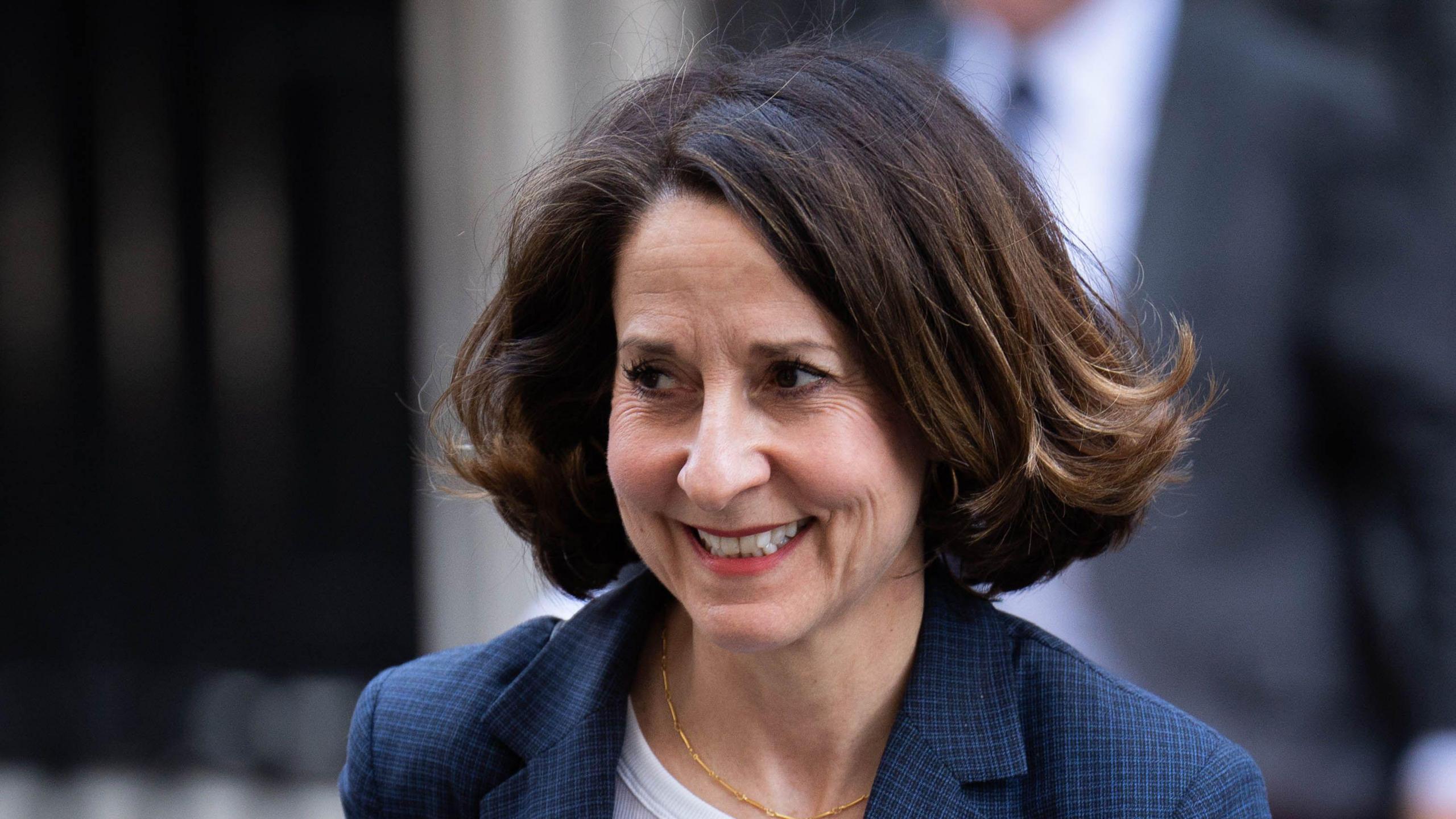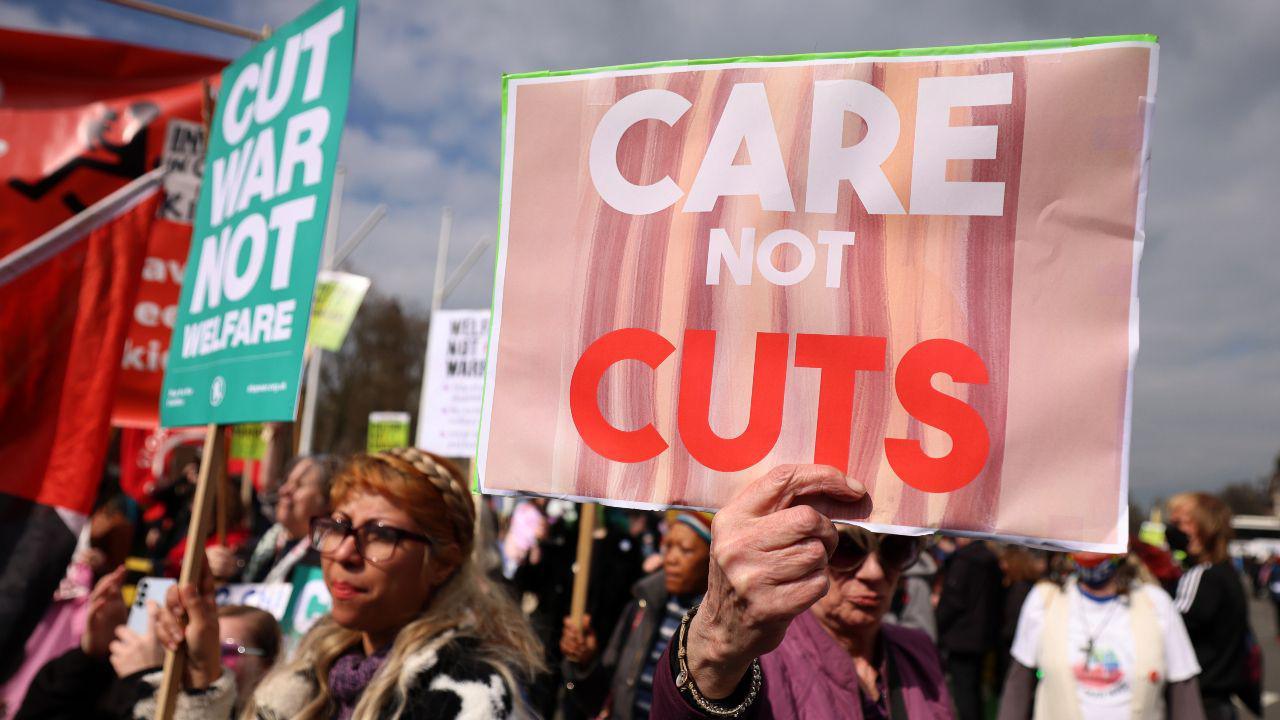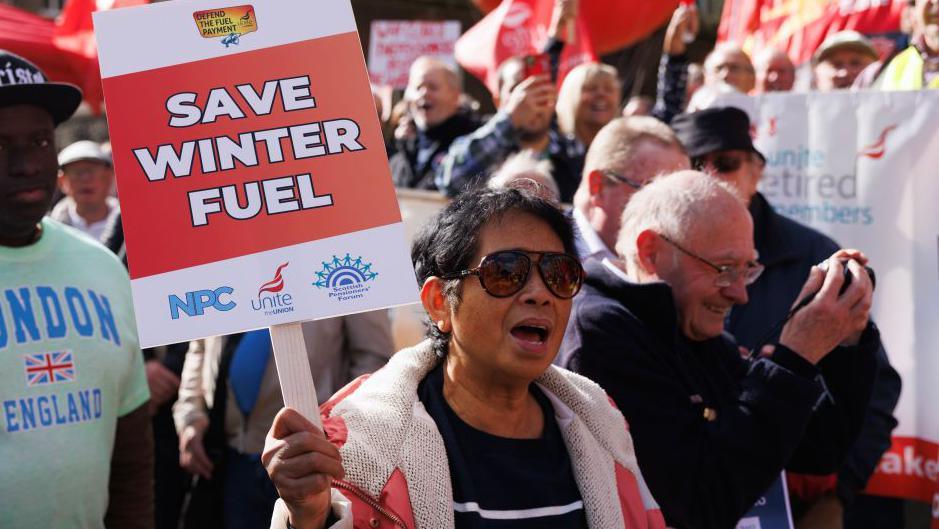Labour MPs mount major bid to block benefits changes

Protesters demonstrating against disability and welfare cuts in March
- Published
More than 100 Labour MPs are supporting a fresh effort to block the government's planned changes to the benefits system.
The MPs have signed an amendment that would give them an opportunity to vote on a proposal to reject the welfare reform bill in its entirety.
Dozens of Labour MPs have expressed concerns about the plans to cut disability and sickness-related benefits payments to save £5bn a year by 2030.
Cabinet Office minister Pat McFadden said ministers would talk to MPs with concerns, but insisted there was "no escaping the need for reform".
Speaking to the BBC's Today programme, he said the number of people on long-term sickness and disability benefits was set to double by the end of the decade.
"I don't think we can sit back and just watch the number of people and the cost to the country increase year on year, without asking the question 'can we do more to help more of those people into work?'".
Ministers have previously attempted to soften the impact of the welfare changes, but many Labour MPs remain discontented with the package of benefits reforms.
The welfare reform bill - called the Universal Credit and Personal Independence Payment Bill - will include proposals to make it harder for disabled people with less severe conditions to claim personal independence payment (Pip).
The amendment, published on the UK Parliament website, external, notes "the need for the reform of the social security system" before outlining reasons why the bill should be rejected.
The reasons it lists for thwarting the bill include the number of people the plans are expected to push into relative poverty, a lack of consultation, and an inadequate impact assessment on the consequences on the jobs market and on people's health.
It is known as a reasoned amendment, which is a parliamentary mechanism which allows MPs to record their reasons for objecting to a bill.
If the reasoned amendment is selected by Commons Speaker Sir Lindsay Hoyle, and the majority of MPs vote in favour of it, the bill will not be allowed to continue its passage through Parliament.
While the success of the amendment is not assured, the level of support for it among Labour MPs indicates the extent of the potential rebellion facing ministers.
Of the 108 Labour MPs who have signed the amendment, 10 are Labour select committee chairs including Meg Hillier and Debbie Abrahams.
Backers also include former Transport Secretary Louise Haigh and Vicky Foxcroft, who resigned as a government whip last week in protest at the bill.
The list of names goes beyond just those who have publicly criticised the government in the past, and also includes more than 50 MPs who were elected for the first at time at last year's election.
This number of Labour opponents to the government's welfare plans could be enough to inflict defeat on Prime Minister Sir Keir Starmer in the House of Commons, were all the opposition parties to oppose the plans too.
The government has a working majority of 165 in the Commons, meaning that 83 Labour MPs would need to oppose the bill to force a parliamentary defeat.
Earlier, Conservative leader Kemi Badenoch said she did not want to alert Labour to her plans before the welfare reform bill was voted on.
A senior Conservative source said the shadow cabinet would be discussing whether to help the government vote through the welfare reforms when they meet on Tuesday morning.
The vote on the government's bill is currently due to take place on Tuesday next week.
McFadden insisted the vote would go ahead, and warned Labour MPs that opposing the government at this early stage of a bill's passage was "a serious step".
'Taken so much grief'
With the clock ticking on the crunch vote, Work and Pensions Secretary Liz Kendall sought to make her case at a meeting of Labour MPs on Monday evening.
She said greater spending on benefits alone was "no route to social justice" adding that a "fairer society" was one "where people who can work get the support they need, and where we protect those who cannot".
One of the main co-ordinators behind the amendment, who did not wish to be named, told the BBC the government's U-turn on cutting winter fuel payments had emboldened many of those who have signed the amendment.
They said MPs "all voted for winter fuel [cuts] and have taken so much grief in our constituencies, so colleagues think why should I take that on again?".
It is understood that plans for the amendment began when the government offered a partial olive branch, by expanding the transition period for anyone losing the personal independence payment.
The same MP said the offering by the government earlier this month was "pathetic".
They said phone calls from Sir Keir and Chancellor Rachel Reeves that were supposed to placate would-be rebels had instead "been entrenching people" to vote against the bill.
They accused No 10 of thinking MPs can be "bullied into voting with them" and said the aim of the amendment was to "send the government back to the drawing board" by forcing them to withdraw next week's vote.
The welfare package as a whole could push an extra 250,000 people, including 50,000 children, into relative poverty, according to the government's impact assessment.
The Department for Work and Pensions says it expects 3.2 million families – a mixture of current and future recipients - to lose out financially, as a result of the total package of measures, with an average loss of £1,720 per year.
This includes 370,000 current Pip recipients who will no longer qualify and 430,000 future claimants who will get less than they would previously have been entitled to.
But ministers have stressed the figures do not factor in the government's plans to spend £1bn on helping the long-term sick and disabled back into work, or its efforts to reduce poverty.
Ministers hope these efforts will boost employment among benefits recipients, at a time when 2.8 million people are economically inactive due to long-term sickness.
If nothing changes, the health and disability benefits bill is forecast to reach £70bn a year by the end of the decade, a level of spending the government says is "unsustainable".
The government is planning to put the welfare reforms in place by November 2026 and no one will lose out on benefits payments until that happens.
Related topics
- Published13 June

- Published23 May

